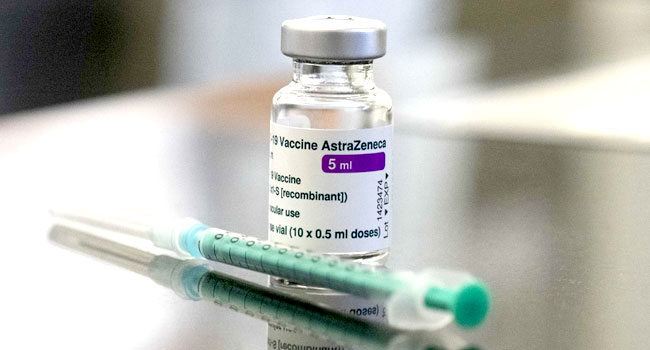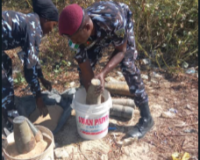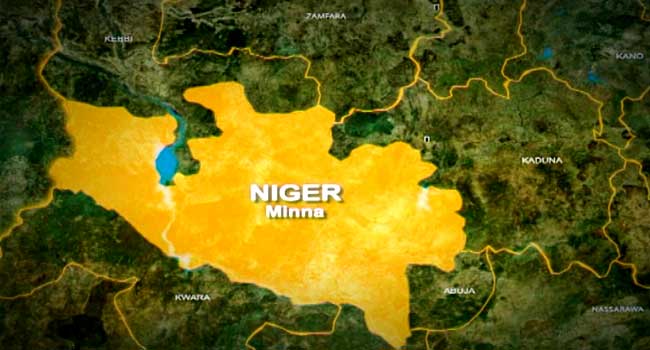Members of the Nigeria Governors’ Forum (NGF) have supported the continued rollout of the AstraZeneca vaccine across the country.
They insisted that the vaccine was safe for use, stressing that no side effects had been reported by those who have so far received the jabs in Nigeria.
Concerns about the use of the AstraZeneca vaccine, which had been suspended in some countries, formed part of the discussions at the meeting of the NGF held on Wednesday.
The meeting which was presided over by the NFG Chairman and Ekiti State Governor, Kayode Fayemi, received a brief on the status of the vaccine roll out from its COVID-19 Technical Advisory Group (CTAG) led by renowned virologist, Professor Oyewale Tomori.
In its briefing, CTAG recommended that Nigeria should continue to vaccinate all eligible persons with the AstraZeneca vaccine, in line with the latest recommendations of the World Health Organisation (WHO).
The governors, in their response, reiterated their belief in the safety of the AstraZeneca vaccine and agreed to continuously encourage uptake of the vaccines by all eligible persons in their states.
They, however, called on the people to report any adverse events noticed after taking the vaccine jabs.
In his remarks, Governor Fayemi congratulated his colleagues for accepting to be vaccinated and declared that so far, the vaccines have not shown any signs of side effects as reported.
Away from the pandemic, he urged the governors to step up their support for the Forum of Governors’ Wives, who he said was driving the campaign against gender-based violence in the country.
The governors also deliberated on illicit drugs and related crimes and pledge their support for the National Drug Law Enforcement Agency (NDLEA) by providing logistics support among others, to enable the agency to deliver on its mandate.
We, members of the Nigeria Governors’ Forum (NGF), at our meeting held today, deliberated on issues affecting the country, particularly on the roll-out of the Covid19 vaccines and the attendant issues that have arisen since the rollout.
The chairman congratulated his colleagues for accepting to be vaccinated and declared that so far, the vaccines have not shown any signs of side-effects as is widely rumoured.
The Chairman also briefed his colleagues on the visit of the Committee of Vice-Chancellors of States’ Universities, the activities of the governors’ spouses around Gender-Based Violence and the VAP Act, calling on his colleagues to step up to the plate in support of the activities of the Nigerian Governors’ Wives Forum nationwide and the progress made with the States’ Fiscal Transparency, Accountability, and Sustainability (SFTAS) project.
The Forum received a presentation from the British Deputy High Commissioner (DHC) in Lagos, Nigeria, Ben Llewellyn-Jones, on the Accelerated C-19 Economic Support (ACES) programme which is aimed at supporting Nigeria’s response to the COVID-19 crisis.
The current focus of the ACES programme in Nigeria is trade facilitation through e-customs and digital jobs booster to activate the digital economy and accelerate the creation of local tech jobs in the country.
Following the presentation, the Forum committed to supporting a Federal Government-led cross-agency trade facilitation as a critical objective of the e-customs programme coordinated through the National Trade Facilitation Roadmap.
Nigeria will be able to achieve the objectives of the e-customs programme (i.e. enhanced user experience, and approximately 10% growth in customs revenue to hit the US$176 billion revenue target) with a broader cross-agency scope of reform, including fulfilling its Word Trade Organisation (WTO) trade facilitation agreement.
Members also committed to encouraging digital infrastructure expansion, accelerator programmes, and investment promotion to facilitate job creation in highly potential digital areas such as IT and business processing outsourcing, digital media, e-commerce, start-up innovation and smart manufacturing based on the comparative advantage of each State.
In the light of this, state governments are encouraged to set up one-stop shops to accelerate approvals and harmonise fees for priority broadband infrastructure across the country.
Furthermore, the NGF Secretariat will partner with the British High Commission, the Boston Consulting Group (BCG), as well as partners at the federal level on the workability of the ACES programme and the role of state governments to maximise its opportunities.
The Forum’s COVID-19 Technical Advisory Group (CTAG) led by Professor Oyewale Tomori briefed members on the status of the COVID-19 vaccine roll out across the States including the increasing concerns of the public on the safety of AstraZeneca vaccines. CTAG recommended that Nigeria should continue to vaccinate all eligible persons with the AstraZeneca vaccine in line with the latest WHO recommendations as available evidence, including findings from research in which some CTAG members are involved showing that the Astra Zeneca vaccine is safe.
Governors reiterated their belief in the safety of the Astra Zeneca vaccines and commit to continuously encourage uptake of the vaccines by all eligible persons in their States, Governors also encourage the public to report any adverse events noticed following COVID-19 vaccination.
Following a briefing from the Chairman/Chief Executive Officer of the National Drug Law Enforcement Agency (NDLEA), Rtd. Gen. Muhammad Buba Marwa on Managing the Drug Crisis in the country, state governors committed to supporting the logistics and operational activities of NDLEA officials in their states, as well as programmes that will promote drug use prevention in the country.
Given the high correlation between drug use and insecurity in the country, the Forum will push for a greater role for NDLEA in Nigeria’s security fight especially as it relates to combating drug abuse and the illicit trafficking of drugs.
H.E Emmanuel A. Akabe Deputy Governor of Nasarawa State briefed the Forum on the inception activities of the Presidential Economic Advisory Council (PEAC) which was set up to accelerate economic growth and lift at least 100 million people out of poverty by 2030.
The PEAC has recommended the development of a poverty and growth strategy for the country focusing among others, on macroeconomic stabilisation, redistribution, structural transformation, and industrialisation.
The strategy will be overseen by the National Economic Council (NEC) through a Steering Committee which should include at least one governor from the six (6) geopolitical zones in the country.
On the States’ Fiscal Transparency, Accountability and Sustainability (SFTAS) PforR, the NGF Help Desk and SFTAS Programme Manager, Mr Olanrewaju Ajogbasile, reported that the Independent Verification Agency has begun preparatory activities for the validation of the 2020 SFTAS Annual Performance Assessment (APA).
He also presented highlights of upcoming technical assistance activities coordinated by the NGF Secretariat for states, including support on preparing Budget Implementation Reports in line with the National Chart of Accounts (NCoA); preparing a State Audit Law for the Offices of the State and Local Government Auditor-Generals; preparing State and Local Governments’ Audited Financial Statements for FY 2020; developing a Domestic Arrears Clearance Framework and Guide on the Online Publicly-Accessible Domestic Expenditure Arrears Database and the reconciliation of State Governments’ Outstanding Debt Obligations (Foreign and Domestic Debt) in collaboration with the Federal Ministry of Budget and National Planning, the Central Bank of Nigeria (CBN), the Debt Management Office (DMO) and State Ministries of Finance.
The latest SFTAS results show that 28 States – (Abia, Adamawa, Akwa Ibom, Anambra, Bauchi, Benue, Borno, Cross River, Delta, Ebonyi, Edo, Ekiti, Gombe, Imo, Jigawa, Kebbi, Kogi, Kwara, Niger, Ogun, Ondo, Osun, Oyo, Plateau, Sokoto, Taraba, Yobe and Zamfara State) achieved the disbursement linked indicator (DLI 12.1) to strengthen their procurement function for COVID-19 or emergency situations and facilitate the participation of SMEs in public procurement in the resilient recovery phase. These States will be eligible for SFTAS disbursements under the DLI.
Lastly, the Forum received a presentation on the 2018 audited accounts of the Nigerian National Petroleum Corporation (NNPC) from the Facility for Oil Sector Transparency and Reform (FOSTER) led by its team lead, Mr Henry Adigun.
The Forum welcomed the fiduciary risk assessment of the corporation. The additional information will support the work of state governments in engaging with the Federal Government to improve the governance arrangement of the oil industry.
Governor Kayode Fayemi
Chairman, Nigeria Governors’ Forum
17th March 2021







